Beth Kephart's Blog, page 133
May 7, 2013
as the damp dark lifted outside my office window this morning....
Published on May 07, 2013 04:00
May 6, 2013
we writers are not down in the earth,

in the hurt of a mine. We are not shucking for treasures in the sea. We are not carrying boulders up the prickly side of Everest. We are not curing a broken vessel in a brain.
Still, writing is what we do, and the work becomes physical at times, wearying in its own strange ways. We sit down to it, and it runs away. We return to the words we thought we'd polished, and we delete delete delete, start a new page.
We despair. Oh. Have I. Ever.
But today I let my thoughts descend to the underworld of Santa Croce Cathedral in Florence, Italy, and found the piece of the story I'd been missing all along—the piece that at long last surprises and exhilarates me.
I can't write unless the work somehow surprises and therefore enlivens me.
I sit with a straighter back.
I reach for a cup of tea.




Published on May 06, 2013 09:23
May 4, 2013
Dear you: When writing a novel (again), remember...

that if you aren't getting the words right—if you hear yourself saying to anyone who will listen, My sentences aren't working—you may be in the midst of a severe misdiagnosis. Sentences only work when the story is working. Sentences that don't pretty up or grit up or do whatever you want them to do are sentences that have no right frame to cling to.
Why this lesson has become my own personal Ground Hog's Day, I'll never know.
But I share it with you, because you are smarter than me.
Signed,
Not a Potter, Not a Ballroom Dancer, and Often Not a Writer




Published on May 04, 2013 05:26
May 3, 2013
Rosemont Book Festival: Be There
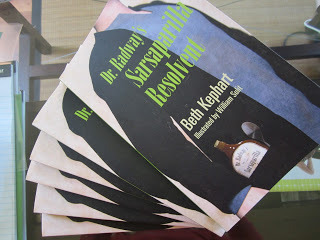
Tomorrow I'll be at Rosemont College for its first-ever book festival. Rosemont College has become a pivotal home to writerly events here where I live and tomorrow's line-up looks exceptional. I'm posting the whole below. I'm so privileged to be included as a member of the young adult book panel, joining April Lindner, E.C. Myers, and Tiffany Schmidt for a conversation titled: YA is Not a Genre.
I will also be seeing Dr. Radway's Sarsaparilla Resolvent out in the wilds for the very first time. Heart beats harder.
But get this, folks, get this: I'll be seeing Kelly Simmons for the third time this week. World record. Read the schedule and find out why.
Workshops
10 - 11 a.m. Poetry Writing Workshop
11 A.M. - 12 P.M. Publishing with Literary Journals & Small Presses
12 - 1 p.m. KidLims with Philadelphia Stories, Jr.
2- 3 p.m. HOOT Literary Review
Panel Discussions (Sponsored By Children's Book World)
11 a.m. - 12 p.m. Young Adult Panel
1 - 2 p.m. Picture Book Panel
2:30 - 3:30 Adult Panel
Readings
12 - 12:20 p.m. Carol Fragale Brill
12:30 - 12:50 p.m. Carol Kasser
1:00 - 1:20 p.m. Susan Lehman
1:30 - 1:50 p.m. Jonathan Callahan (Tentative)
2:00 - 2:20 p.m. Joan Hanna
2:30 - 2:50 p.m. Jeff Markovitz (Tentative)
3:00 - 3:30 p.m. Nicole Monaghan
3:30 - 3:50 p.m. Melissa and Sara McDemott




Published on May 03, 2013 16:19
May 2, 2013
The Philadelphia Inquirer review of Dr. Radway's Sarsaparilla Resolvent: Dazed and Grateful
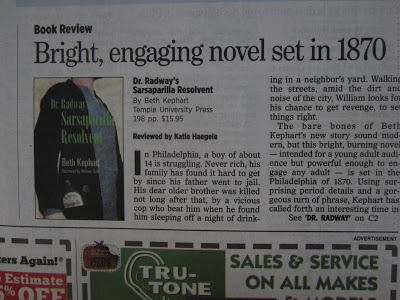
The day began early, as they do, and I was out when the emails started to come in about a Philadelphia Inquirer review of Dr. Radways's Sarsaparilla Resolvent. Email after email.
Congratulations!
But it wasn't until just now that I had the time to find the story myself, and I am floored. Floored.
I never knew if anyone would read this book when I wrote it, rewrote it, rewrote it. I never knew if it would find a publishing home. I just knew how much I loved William and his Philadelphia, and so I carried on.
Katie Haegele, how do I thank you for words like these?
The bare bones of Beth Kephart's new story sound modern, but this bright, burning novel—intended for a young adult audience but powerful enough to engage any adult—is set in the Philadelphia of 1870. Using surprising period details and a gorgeous turn of phrase, Kephart has called forth an interesting time in our city's history and made it live again for just a moment.
And later:
The language is what does it. These people feel real, and we have no trouble imagining them living out their dramas just as painfully and joyously as we do ours, 100 or more years before we were born.




Published on May 02, 2013 10:47
walking William's beat, yesterday, in Spring Garden



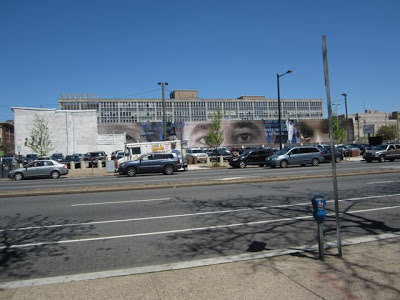
Yesterday, while walking to a meeting of fellow Philadelphia lovers and writers (so happy to see so many beautiful faces) I took a moment to be with William, the Dangerous Neighbors character I simply could not let go who therefore stars in my new 1871 Philadelphia book, Dr. Radway's Sarsaparilla Resolvent. William lived on Carleton Street. He walked through territory that was once crowded and clonking with machine shops and rail yards. He rescued lost animals for a living.
This is a view of his world now, including Matthias Baldwin Park, a small snatch of land now given over the memory of one of Philadelphia's greatest entrepreneurs—the man whose rail machinery shops occupied many blocks of this neighborhood.




Published on May 02, 2013 03:53
May 1, 2013
more student love: Daniel Blas in the Pennsylvania Gazette

Sometimes I just want to fluff back against a frothy pillow and consider the wonders of my students.
Last week, in the Philadelphia Inquirer, I wrote about Leah Apple, now a Fulbright winner, who has changed the lives of West Philadelphia children through an initiative called CityStep Penn. I wrote a recommendation letter for a gifted bioengineer who spent much of this past year inventing (with others) a device that allows children with cerebral palsy to take their own photographs (all while writing remarkable memoir/profile pieces for 135.302). I whispered pretty somethings into the ears of people making decisions about students' futures. I exchanged emails with my Katie, who graduated a year ago and has been working in New Orleans with Catholic Charities as a triage artist (I call her an artist) before she heads off for medical school. In the pages of Handling the Truth, my book about the making of memoir due out in August, my students sing. I wrote that book in large part because I love to hear them sing. Because sometimes I just want to fluff back against a frothy pillow and consider the wonders of my students.
Today I am celebrating the work of Daniel Blas, a tall and slender Whartonite with transparent integrity—a young man who may have actually mostly been studying, say, risk and insurance, and reading, say, the Wall Street Journal, but who never failed to move us with his surprising ironies, his soft-shoe humor, his Calvin Trillin touch. Dan came to my class this spring semester at the suggestion of Al Filreis. He sat in the same chair, to my left, every single Tuesday—steady and just the right amount of sure, conveying Springsteen adorations to a prof just slightly obsessed with her own Springsteen adorations. Dan slayed us with details and structural magic. We wanted more.
Here, in the pages of the Pennsylvania Gazette, is more—Dan's Springsteen memoir (which is actually about Dan's relationship with his concert-loving dad) abbreviated and modified for the Gazette readers. Dan worked with Trey Popp to perfect this piece, and I am over the moon that "Always Wear Tie Dye" now sits in the pages of this fantastic magazine.
You'll read Dan here and you'll be glad you did. And then, if you haven't already read the Gazette-bound work of my other students, I share it all again below:
Maggie Ercolani
Nabil Mehta
Joe Polin
Moira Moody
To the power of the young. To Bruce Springsteen and Daniel Blas and the dad who started it all.




Published on May 01, 2013 02:14
April 30, 2013
your son's happiness. don't you dare run past.
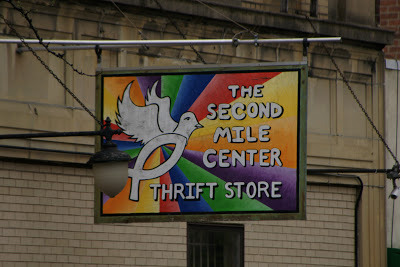
Life goes by. It goes by fast. And some days you are up at three, working, and sixteen hours later, you aren't even close to done; you are even more behind, and you are talking too fast, your mind on overdrive.
And you don't know who you might have offended by talking too fast, too much, too overwhelmedly. You don't know. You're sorry.
Then your son calls while you are running to Whole Foods to buy tilapia, broccoli, sweet potato fries (you're taking short cuts). And he explains this new job he has—how, precisely, this business of media planning works. How he has his own clients now, three weeks into the job, how he writes a proposal, sends it to a client, gets an email, all capital letters, from his boss:
G R E A T J O B, J.
And you know in that instant, while you are running, while the sun is setting, while your mind is on overdrive, that this is it. This is what you cannot run past:
Your son's happiness.




Published on April 30, 2013 16:55
The new poverty, the power afflatus, and the eloquence of George Packer (in The New Yorker)

You know how it is with me and The New Yorker. How, when I find the time, any time, I reach for the nearest issue.
Last night I took the April 29 into hand, opened to "Don't Look Down: The new Depression journalism" (George Packer) and didn't look up again until I'd read through. A lesson on Dos Passos, Edmund Wilson, James Agee. A look at the new journalism provoked by our present economic woe. A look at the stories, the real people, behind the work of Barbara Garson, Charlie Le Duff, Chris Hedges, others. Multiple uses of the term "powerful afflatus." (Afflatus: divine imparting of knowledge or power/inspiration (see Merriam-Webster).)
Good God. To know what Packer knows. To write as he does.
To bear witness to people such as Tina Hall, extracted by Packer from the pages of a D.W. Gibson book called Not Working: People Talk About Losing a Job and Finding Their Way in Today's Changing Economy. Packer's synopsis:
Tina Hall, a former supervisor at a mortgage company, loved her next job, working with schizophrenic adults. When she lost that, she became a teacher's aide in special education, and loved, loved, loved it. When that position was terminated, she cleaned houses, then took care of a couple of kids after school, making just sixty-five dollars a week—falling into the ranks of the working poor.... She tried to keep smiling. All she wanted was more work.
Packer suggests that the Great Depression "left people more helpless and isolated" while the new depression "seems to have produced less hope." That we are on our own. That our new impoverishment looks like hours in front of the internet, searching, days in front of the TV, losing more hope.
We all know those who have lost in this environment. Some of us see the lessening, the rubbing away, the not every day—near and dear. I read Packer at the end of a very long day during which I'd said, more than once, I'd give anything to have less work to do.
I think I should stop saying that now. I think I should feel blessed.




Published on April 30, 2013 05:17
April 29, 2013
Strange and Familiar Places in Young Adult Fiction, with Eliot Schrefer and Rita Williams-Garcia, at Drexel University
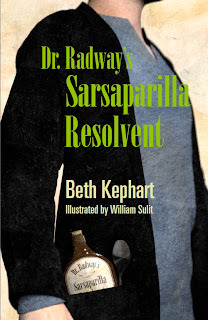

I'm honored to be included among friends in an upcoming YA panel—open to the public—at the Drexel University Week of Writing event. To see all the offerings, go here. (I am particularly intrigued by the panel that will help those of us who receive unusual comments from anonymous commenters know, um, what to do or think.) To join Rita Williams-Garcia, Eliot Schrefer, Dee McMahon, and myself for a discussion about research, time, and place in young adult fiction, make room for us on May 22.
See you there?
Strange and Familiar Places in Young Adult Fiction
Explores the complexities of conducting and incorporating research to
create a sense of time and place in YA fiction. Attention to setting is
crucial for any writer, but readers often overlook the breadth of
historical, scientific, and philosophical inquiry that culminates in
successful settings. Panelists include: Beth Kephart, who will speak on
the surprises and challenges of bringing 19th-century Philadelphia to life in Dangerous Neighbors (2010) and Dr. Radway’s Sarsaparilla Resolvent (2013); Eliot Schrefer, whoseEndangered (2012)
depicts a bonobo sanctuary as war breaks out in the Democratic Republic
of the Congo; and Rita Williams-Garcia, who will describe her research
process in recreating the Black Power Movement in 1968 Oakland forOne Crazy Summer (2011) and its sequel in Brooklyn P.S. Be Eleven (2013).
Join us to discuss the craft of translating not just physical and
geographical detail, but larger social and political contexts to the
page.
2:00 pm – 3:20 pm
Lobby of Drexel University Recreation Center
Moderator: Dee McMahon
Panelists:
Beth Kephart, Eliot Schrefer, Rita Williams-Garcia




Published on April 29, 2013 09:57






